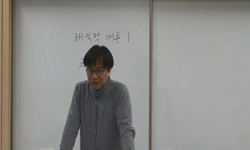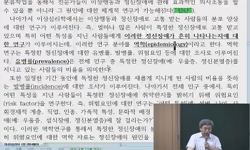저자 개념이 문학 영역에서 이론적으로 정립되었던 시기는 서구 근대성이 확립되었던 17-18세기라고 할 수 있다. 근대성은 사회학적으로는 시민 사회의 발생, 철학적으로는 관념론적 주관철...
http://chineseinput.net/에서 pinyin(병음)방식으로 중국어를 변환할 수 있습니다.
변환된 중국어를 복사하여 사용하시면 됩니다.
- 中文 을 입력하시려면 zhongwen을 입력하시고 space를누르시면됩니다.
- 北京 을 입력하시려면 beijing을 입력하시고 space를 누르시면 됩니다.
저자의 죽음인가, 저자의 부활인가?
한글로보기https://www.riss.kr/link?id=G3792600
- 저자
-
발행기관
-
-
발행연도
2015년
-
작성언어
Korean
-
주제어
저자 ; Author ; Text ; Reader ; greek art ; Aristoteles ; Platon ; typography ; civil society ; philosophy of subject ; Schlegel ; Novalis ; Hegel ; Blanchot ; Ricoeur ; Barthe ; Foucault ; Luhmann ; Derrida ; Poststrukturalism ; Deconstruction ; autobiography ; Lee Kwang Soo ; Kim ; 저자성 ; 플라톤 ; 헤르메네스 ; 파르마콘 ; 슐레겔 ; 노발리스 ; 슐라이어마허 ; 해석학 ; 이광수 ; 김동인 ; 이상 ; 프렌치 레터 ; 가다머 ; 블랑쇼 ; 푸코 ; 바르트 ; 오거스틴 ; 루소 ; 데리다 ; 해적당 ; 하이델베르크 호소문
-
자료형태
한국연구재단(NRF)
-
0
상세조회 -
0
다운로드
부가정보
국문 초록 (Abstract)
그러나 19세기 중반 저저 개념에 있어서 커다란 변화가 발생한다. ‘작품’과 ‘텍스트’는 의미상의 미묘한 차이를 내포하고 있다. ‘작품’이라는 용어는 ‘저자’와의 관계가 완전히 단절되지 않은 뉘앙스를 담고 있다고 할 수 있는 반면에, ‘텍스트’라는 용어는 ‘저자’로부터 독립되어 언어 자체가 말을 하는 것으로 볼 수 있기 때문이다. 이러한 저자의 위기는 20세기 중반 바르트, 데리다 등에 의해 “저자의 죽음”으로 이어진다.
최근에 저자와 저작권의 개념은 더욱이 디지털 문화의 대두와 함께 엄청난 도전에 직면해 있다. 인터넷 공간에서 저작권을 둘러싼 논쟁이 가열되면서 “저자의 죽음”에 대한 이론은 다시 소생한다. 인터넷이 의사소통의 새로운 시대를 개척한 혁명적 현상이라는 것을 인정한다면, “낡은” 의사소통 방식의 소산인 저자나 저작자의 권리 주장은 시대착오적으로 보일 수 있다. 저자로서의 주체와 독자로서의 공동체 간의 차이는 소멸되고 저자와 독자는 똑같은 복사자일 뿐이다. 어찌 보면 컴퓨터가 작동시키는 세계는 텍스트의 저자와 필사자, 주석자 간의 차이가 없었던 중세시대와 같은 상황인 것이다.
저자 개념이 문학 영역에서 이론적으로 정립되었던 시기는 서구 근대성이 확립되었던 17-18세기라고 할 수 있다. 근대성은 사회학적으로는 시민 사회의 발생, 철학적으로는 관념론적 주관철학의 정립, 정치적으로는 도덕적이고 책임 있는 개인의 의식과 행동에 대한 요청 같은 여러 가지 현상과 매우 밀접한 관계를 맺는다. 인간 스스로가 종교적 지배에서 벗어나 세계를 새롭게 형성하고 변화시키는 주체로 파악되었듯이, 저자 또한 텍스트의 주인이며 천부적인 생산 주체로 여겨진 것이다.
그러나 19세기 중반 저저 개념에 있어서 커다란 변화가 발생한다. ‘작품’과 ‘텍스트’는 의미상의 미묘한 차이를 내포하고 있다. ‘작품’이라는 용어는 ‘저자’와의 관계가 완전히 단절되지 않은 뉘앙스를 담고 있다고 할 수 있는 반면에, ‘텍스트’라는 용어는 ‘저자’로부터 독립되어 언어 자체가 말을 하는 것으로 볼 수 있기 때문이다. 이러한 저자의 위기는 20세기 중반 바르트, 데리다 등에 의해 “저자의 죽음”으로 이어진다.
최근에 저자와 저작권의 개념은 더욱이 디지털 문화의 대두와 함께 엄청난 도전에 직면해 있다. 인터넷 공간에서 저작권을 둘러싼 논쟁이 가열되면서 “저자의 죽음”에 대한 이론은 다시 소생한다. 인터넷이 의사소통의 새로운 시대를 개척한 혁명적 현상이라는 것을 인정한다면, “낡은” 의사소통 방식의 소산인 저자나 저작자의 권리 주장은 시대착오적으로 보일 수 있다. 저자로서의 주체와 독자로서의 공동체 간의 차이는 소멸되고 저자와 독자는 똑같은 복사자일 뿐이다. 어찌 보면 컴퓨터가 작동시키는 세계는 텍스트의 저자와 필사자, 주석자 간의 차이가 없었던 중세시대와 같은 상황인 것이다.
다국어 초록 (Multilingual Abstract)
In the mid-nineteenth century, however, there appeared a great change in the concept of an author. There could be a sematic difference between the terms, "work" and "text." The "text" is separable from the author and can speak about itself, whereas the word "work" still retains a nuance not completely separated from the author. This crisis of the author was often linked to the postmodern slogan, the "death of an author," proposed by such thinkers as Barthes and Foucault.
Moreover, the concepts of an author, or authorship, is recently being confronted with another big challenge by enormous production of digital texts. The Internet authors revive the burn
It was along with the rise of modernity in 17-18 centuries that the concept of an author was established in the cultural realm of the western world. The concept is closely related with diverse phenomena of the time, socially with the advent of bourgeo...
It was along with the rise of modernity in 17-18 centuries that the concept of an author was established in the cultural realm of the western world. The concept is closely related with diverse phenomena of the time, socially with the advent of bourgeois class, philosophically with the subjective idealism, and politically with the call for individuals' responsible and moral consciousness and behavior. This indicates that as individual human beings began to behave as a subject who shapes the world anew, getting freed from religious obligations, so were the authors considered to possess the inalienable ownership of texts.
In the mid-nineteenth century, however, there appeared a great change in the concept of an author. There could be a sematic difference between the terms, "work" and "text." The "text" is separable from the author and can speak about itself, whereas the word "work" still retains a nuance not completely separated from the author. This crisis of the author was often linked to the postmodern slogan, the "death of an author," proposed by such thinkers as Barthes and Foucault.
Moreover, the concepts of an author, or authorship, is recently being confronted with another big challenge by enormous production of digital texts. The Internet authors revive the burn











